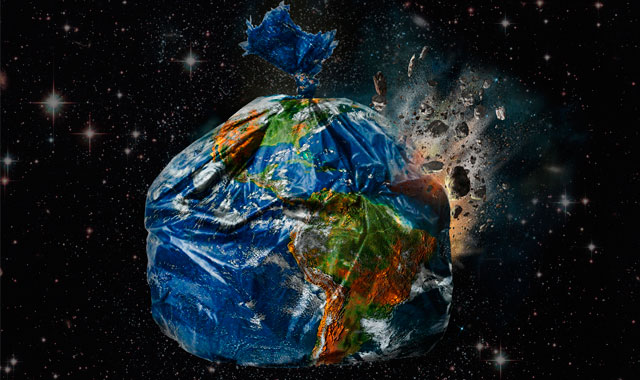
Smart wearable technologies, such as the Apple Watch, are this year’s “must have” item — their makers are banking on it. Apparently, there is a model for everyone. As always, professional high-tech-trend watchers (a pun now worn on their wrists) are not just selling the commodity; they are also spreading the faith in the magic of the machine, the gadget’s enveloping mist of enchantment that compels us to buy it.
Ironically, electronic consumerism has erased any connection we might once have had to notions of earthly plenitude. We now live as devices of our own devices, not as inhabitants of a living planet. The pace of our high-tech evolution has rapidly crossed the line of environmental sustainability, ravaging any sense of balance between what the Earth can give to support human activity and what the Earth can safely re-absorb from those activities.
As a species-for-things, we spend about US$1 trillion a year on consumer electronics. According to the International Energy Agency, the more than 14bn network-enabled devices in use today account for 15% of global residential energy use.
If this trend continues, the residential electricity needed to power our digital gadgets will rise to 30% of global consumption by 2022, and 45% by 2030. On top of this, every time we create and receive data on the move, electricity runs through the data centres and telecommunications networks that connect mobile devices to service providers and the cloud.
When we join all the dots between our high-tech lifestyles and the power grid, a carbon footprint the size of the aerospace industry’s emerges. If we do not seek out green alternatives to fossil fuels to deal with the rising energy burdens of our mobile devices, our digital consumption will continue to contribute massively to environmental ills.
Our love affair with high-wattage goods is also the leading cause of electronic and electric waste. Consumers produce e-waste at an annual rate of up to 50m tonnes worldwide.
In the last decade or so, e-waste became the fastest growing part of all the stuff we throw away. And this stuff is full of toxins that if not properly removed, re-used or recycled, can poison the land, air and water, as well as the bodies of workers exposed to the chemical contents.
While waste is a problem throughout the lifecycle of any electronic device, from over-used and contaminated water in the production process to discarded solvents, it is also designed into high-tech goods. The pernicious business strategy of planned obsolescence dominates corporate thinking — yet it seems we don’t really care as long as the mist of enchantment surrounds our consumption.
But this destructiveness makes for a searing reality for those working in the world’s e-waste dump sites. Wealthy high-tech nations dump 80% to 85% of their e-waste in Latin America, Eastern Europe, Africa and Asia. Recent estimates from the United Nations suggest that China receives 70% of all e-waste.
In these low-tech salvage yards, low-skilled workers are exposed to heavy metals (lead, cadmium, chromium and mercury), burnt plastics and poisonous fumes. They risk vertigo, nausea, birth defects and disrupted biological development in children, along with brain damage and diseases of the bones, stomach, lungs and other vital organs. The ecological impact is also profound.
Consider Guiyu in Guangdong Province, China, where 80% of local families now work in recycling e-waste. Guiyu was once a farming town, but contaminants from recycling have saturated the human food chain. Persistent organic pollutants in the soil and water prohibit the safe return of affected agricultural lands to future generations. Even if people wanted to go back to a mixed economy that included agriculture, they would produce poisoned crops.
Break your gadget addiction
All this might seem to be taking place beyond the horizon of our electronic lifestyles. But people are beginning to wise up to what labour and environmental activists and activist scholars have known for a long time.
More and more consumers are re-evaluating their love of the machine and starting to reduce their buying of new gadgets. They are also recycling old electronics as another routine duty of environmental citizenship.
In a growing number of workplaces, schools, residential buildings and neighbourhoods, green is the new normal. Many states, municipalities, national governments and regional blocs have passed laws to ensure the safe disposal of e-waste. New organisations are forming to stop digital devices from poisoning ecosystems in their place of manufacture; to push for more extensive end-of-life management for e-waste; and to press for ecologically sound manufacturing that protects the biophysical rights of all the Earth’s inhabitants.
We still have the social agency to escape from the vibrations and ringtones that sing our body electric into misty slumber. We can wake up to the challenges of climate change, ocean acidification and a planet overdosed with nitrogen.
We know how to reduce the massive levels of conventional pollution. We may not be able to reverse the “sixth great extinction”, but we can conserve habitats and mitigate the rapid loss of biodiversity.
All of us, through our teaching, activism and research, can demand a culture of sustainability over the prevailing one of consumerism. Any ideas of sustainability based on the understanding that the Earth has limited resources to support human activity should be built on an ethics of intergenerational care.
The Apple Watch and its many siblings are here. But what we really need is a materialist ecological politics and ethics to help us navigate out of the present eco-crisis.![]()
- Richard Maxwell is professor of media studies, Queens College, City University of New York
- This article was originally published on The Conversation

